19. First year LLB student. Blog to track my progress, collect and organize resources, and talk about what I find interesting.
Don't wanna be here? Send us removal request.
Photo

from todays online class .. I really enjoy typing notes, they’re far more accessible
0 notes
Text


thursday october 29 2020
essay planning 📚 does anyone else brainstorm using sticky notes?
1K notes
·
View notes
Text
week #2 - getting into it.. happy october
Sigh. Well this week wasnt really a success, was swamped the whole week through, spent the weekend running errands, dealing with family problems, and being sick. I did not manage to go get my laptop or finish the reading I’d set up for myself. But it’s alright.. I can catch up. To stay brief I’ll just sum up what we studied this week, things to look up, and my progress
┈ ┈ ┈ ⋞ 〈 ⏣ 〉 ⋟ ┈ ┈ ┈
LSM - Sources of law upto ECHR
CRIM - actus reus and ommission via commission. sidenote, the prof is really fast with his teaching. should up my pace for this one
CONTRACT - uni and bi contracts, how they differ, ads, tenders, communication of offers, and two important cases, R v C and Gibbons v Proctor
PUBLIC - Prof basically explained how important parliamentary sovereignity is. Need to buy the notes for this class, honestly.
┈ ┈ ┈ ⋞ 〈 ⏣ 〉 ⋟ ┈ ┈ ┈
I updated my reading order.
LSM UoL study guide [5/7]
Criminal Law UoLstudy guide [4/15]
Public Law UoL study guide [0/20]
Contract Law UoL study guide [0/17]
Currently need to do 3 chapters of crim, con, and pub + finish notes on wilson chap one. I’ll need luck for this one.
0 notes
Text
week #1 - organizing & outlining
So, just got through with my first week at uni. Only two lectures so far, both mostly full of introductions and occasional interruptions by a healthinspection team for corona. Honestly, didn’t learn anything I hadnt already in a levels, but thats ok. Introductory classes after all. I’m just hoping my one edge lasts when I’m in a class fullll of kids from families of law firms and politicians.
Right now I have a few questions I need to answer.
What do I give priority to here at the start?
How should I divide my studies up? What types of notes should I make? How should I go about this?
What resources do I need to pick and look for?
What is the purpose of this blog?
ANSWER #1
I have a lot to improve on. But to look at each thing is so overwhelming that it leaves me in a state of paralyis. So for now, Im listing them out in order of importance to me
> Get my shit in order. Collect my books, get my new laptop, and set up a good study space
> Figure out my routine. I hate routine. But without any good transport methods it becomes necessary. Two issues with this, one that my mom is difficult and doesnt give me a lot of control on my own schedule. Second is that the library has the texts, but my home has the laptop. I suppose I’ll start taking my ext hard drive but it’ll still be a tad inconvenient
> Make friends and connections. I really need to set up a study system, I like stuydying with people. I also need people to fall back on in case I miss lectures and the like. As much as I hate interacting with people who I can’t be myself around, it will be a necessity. Tangentially related, I need to figure out how I want to appear to others + buy some new clothes for God’s sake.
> Learn TOUCH TYPING. This will be essential if our exams will be given online. Even now I’m typing with jsut two fingers. god. Need to get a speed of 80wpm by the end of this year. Please.
ANSWER #2
I’ve got 5 notebooks so far: class notes, personal notes, cases and summaries, general notebook? [not so sure about this one], and I plan on buying a binder with loose paper to organize final notes. Another thing I need to consider is using OneNote, but that’ll be easier when I finally get my own laptop.
I’ll divide by subject, subjects into chapters, then each chapter as a whole into different aspects to study with.
Primary notes [study guide] + Extra material notes + core concepts and analysis.
Furthermore, summarize each chapter in my own words in an essay form. A blog post from an old LLB UoL graduate recommedned something similar.
Finally, do the activities and tasks at the end of the module.
Now, further along the road, I should start looking up past papers and examiners reports. I should regularly consult my professors too, ask them on my methods and clear up any confusion I may have in my core concepts. Perhaps I’ll find a purpose for that general notebook after all in this regard lol
ANSWER #3
I dont quite know why I asked myself that on this blog post... I’m already looking through the study guide for stuff to refer to. Must remind myself to consult professors on what material is most necessary as well.
ANSWER #4
A few things come to mind. i want this blog to motivate me, first of all.
Collect tips, advice, and resources
Weekly summaries of what I’ve done and how uni went and general areas I need to improve upon
Perhaps I should upload chapter summary essays on here too. If I type out my notes on cases as well I will post them here.
Links and stuff I find interesting
Organize my reading list and how far I am with them. Include them in my weekly updates. Perhaps my weekly updates should also contain my goals for the week
┈ ┈ ┈ ⋞ 〈 ⏣ 〉 ⋟ ┈ ┈ ┈
WELL now that ive managed to spell all that out for myself, I think ill just talk about other stuff now.
the teachers seem nice. the criminal law prof does sound a bit intimidating but the lsm professor was very lax, and the contract law prof was very helpful in explanations and i had a talk with him about materials.
i met three people in class so far, janita, sofia, and zainab. i will try talking to them more, but theyre all rather shy in my opinion. i met an IR student called nawal, she was very sweet and likes makeup and fashion. we talked enthusiastically within moments of meeting one another, i cant even remember how many topics we bounced back and forth between. very easy to talk to, and she doesnt have an instagram so.. well not to be superficial , but that does my raise my opinion of her.
thats all for the personal section
┈ ┈ ┈ ⋞ 〈 ⏣ 〉 ⋟ ┈ ┈ ┈
WEEKS GOALS
get laptop
make fee payment to uol
pester SWQ for study guide. i know he has some copies squirelled away i know it..!!!
ask about student gym + again pester SWQ abt the current library system cause.. wtf!
┈ ┈ ┈ ⋞ 〈 ⏣ 〉 ⋟ ┈ ┈ ┈
READING
In order of importance
LSM UoL study guide [5/7]
Criminal Law UoLstudy guide [3/15]
Public Law UoL study guide [0/20]
Contract Law UoL study guide [0/17]
Learning Legal Rules [0/12]
I made it through 5 chapters with notes within a week. Assuming I can up the pace to about 6, I can manage to get halfway through the rest of these study guides within 3 or 4 weeks.
I only need to get halfway through, because I need to be slightly ahead of the class, not fully. Then I can focus on learning through textbooks, starting with LSM. It’s the most boring, so Id like it out of the way as soon as possible.
0 notes
Text
The significance of plot without conflict
In the West, plot is commonly thought to revolve around conflict: a confrontation between two or more elements, in which one ultimately dominates the other. The standard three- and five-act plot structures–which permeate Western media–have conflict written into their very foundations. A “problem” appears near the end of the first act; and, in the second act, the conflict generated by this problem takes center stage. Conflict is used to create reader involvement even by many post-modern writers, whose work otherwise defies traditional structure.
The necessity of conflict is preached as a kind of dogma by contemporary writers’ workshops and Internet “guides” to writing. A plot without conflict is considered dull; some even go so far as to call it impossible. This has influenced not only fiction, but writing in general–arguably even philosophy. Yet, is there any truth to this belief? Does plot necessarily hinge on conflict? No. Such claims are a product of the West’s insularity. For countless centuries, Chinese and Japanese writers have used a plot structure that does not have conflict “built in”, so to speak. Rather, it relies on exposition and contrast to generate interest. This structure is known as kishōtenketsu.
Keep reading
44K notes
·
View notes
Text
https://digestiblenotes.com/law/constitutional_cases/human_rights.php
0 notes
Text
EMAILS TO MAKE YOUR LIFE EASIER
Hello friends and enemies,
I have decided to do a masters degree for some fucking reason. Due to these godforsaken circumstances, I am going to be a student again.
Now, based on my experience being an undergrad with my Brain and Misc Issues, I knew that my hubris in pursuing YET MORE EDUCATION would result in having to write a lot of stressful emails, while dealing with a stressful situation.
So, to help myself cope in advance, I’ve decided to write drafts of these emails in advance, so that it’s less agonisingly painful to deal with this shit when it comes up.
And you can use them too!
under the cut, I have some draft emails for when you need to tell your lecturers:
I’m going to miss a lecture.
I have missed a lecture
I will be turning in an assignment late
I have missed a deadline
I have had a personal crisis which impacts my studies.
SEND AT START OF SEMESTER: explaining that you fidget/stim without using the word stim.
Keep reading
5K notes
·
View notes
Text


august 31st - 10.16pm
property law please love me Back™️
1K notes
·
View notes
Text
cornell notes method





Hey all, it’s werelivingarts. I’ve been introduced to this note-taking method by my history teacher, and I would say that it’s been working very well for me! I create mini guide on how to start utilizing this method, hope this help! ❤️💜💙
958 notes
·
View notes
Photo
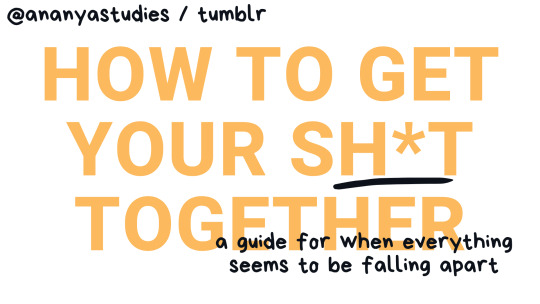

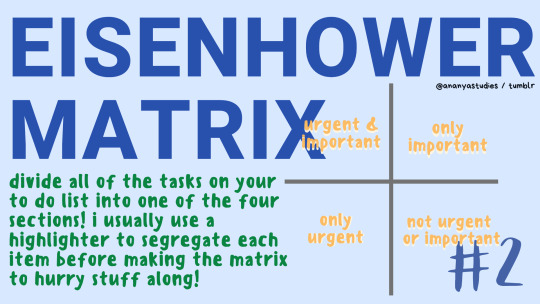
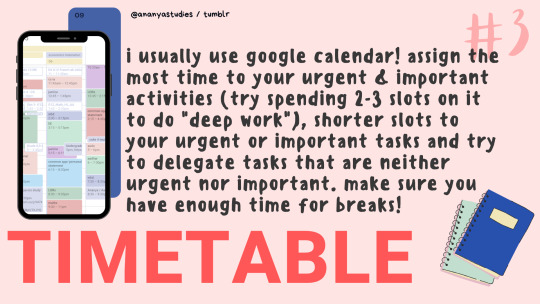
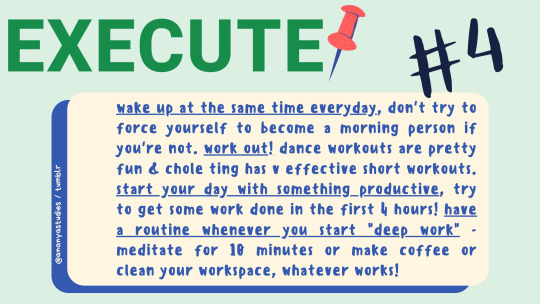
hey! i made my first graphic!! i hope it helps 🥰
4K notes
·
View notes
Text
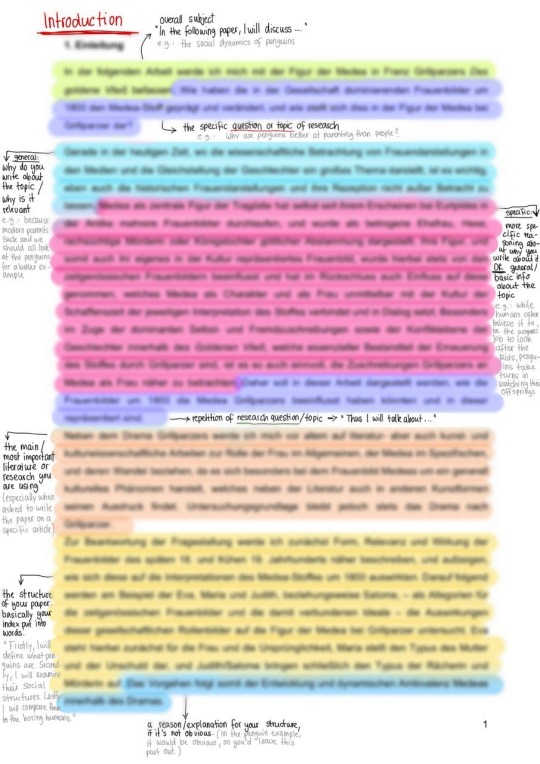
[In case anyone needs help with this: how to structure the introduction of a piece of academic writing]
285 notes
·
View notes